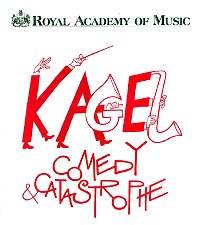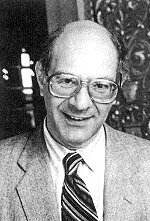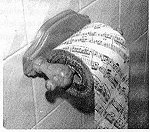
Mauricio Kagel (b.1931) moved to Cologne from Buenos Aires because Germany was the first European country to offer him a study grant, and they have greatly profited from his industry, imagination and humour. He is a serious entertainer, for whom humour, irony and double meaning are all important. His output in all conceivable genres has been colossal and this was the first opportunity in UK to get a broad perspective. There were fifteen events over four days in this festival organised by Artistic director Paul Patterson and S&H was able to attend six of them. Kagel took part in the final stages of preparation of the performances and talked about his life and beliefs with his former composition pupil David Sawer.
A few points from his talk demonstrate his ever-enquiring mind:-

Kagel grew up under the Peron dictatorship (his siblings were jailed) but
he recalled gratefully the intellectual atmosphere amongst people of various
backgrounds, with anti-Fascists from Germany, Spanish & Italian Jews,
literature being very important. He failed the harmony test to get admitted
to the Buenos Aires Conservatory and went to Germany, which was the first
European country to offer him a Fellowship, settling in Cologne, where he
still lives and is appreciated. His piano teacher had told him he asked too
many questions, so would never be a pianist - he'd better be a composer instead.
There had been no sense of a 'hegemonic culture' in Argentina, 'fortunately
no heritage'. He deplored the nationalism of musical life he encountered,
to some surprise, in Europe, France and Germany each with its narrow culture.
It saddens him that nationalism continues, 'very sad'. His music is often
politically engaged, but obliquely so. His Homage to Beethoven Ludvig
van tackles 'the atrocities against our greatest legacy - - allowing
our greatest loved music to be taken for granted and manhandled'.

The commission is the 'pretext' to compose; 'without deadlines music history wouldn't be!' The occasion for his Orchestrion-Straat was an unusual Amsterdam commission; 'you should not over-analyse the occasion, aim at the occasion plus the universal', he advised student composers, 'put energy into the musical language and the work may transcend the occasion' and get further performances.
He had to cope with critics dismissive of his very personal approach, but the impact of his music proved strong and he is proud of being honoured with this festival 'when you are alive'! He deplores the absence of a tradition of humour and the puritanism and 'mask of seriousness' which pervades cultural life. He is attracted to the humour in Kafka & Beckett which so many people miss. It appeared that he sees himself too as 'a tragical figure making jokes'. He has collected a dozen instances of conductors who died on the rostrum, and built this into Finale composed for his own 50th birthday, a time to ponder mortality.
He says his curiosity is as keen as 50 years ago and he is interested in how the young of the new generation react. He deplores excessively difficult music 'written for other composers' - 'complexity has become a normal mode of expression, relatively easy to do'. Discussing 'the problem of hermeticism and its pseudo-intelligence' - music needs to communicate. He likes intelligent music, not intelligent music. He writes detailed programme notes because of the 'need to compensate non-verbal art with information', hopefully leading to enlightenment.
Every concert programme should be carefully designed to be a 'very intelligent manifesto'. Programmes should be shorter and always include one work played twice, for the pleasure of repetition and the opportunity then 'to take a position'. His music is precisely notated and he has nightmares of bad performances at wrong speeds, but is happy with good ones; he prefers 'wrong notes in the right tempo'.
The RAM Tango! programme partway exemplified Kagel's attitude. His own music was given in context with three examples from the Yvar Mikhashoff Tango Collection (see S&H review ). There was some Piazzola, and three specially written student compositions which stood up well in this company. I enjoyed especially the first item, Kagel's Tango Alemán, one of several during the week which featured the accordion; 'a pathetic story' told in an imaginary language by Scott Belluz with great aplomb as he strutted around the stage. But there was nothing really difficult at first hearing and no repeats.
The Manson Ensemble excelled under the direction of James Wood in Kagel's Orchestrion-Straat, evoking street organs in Amsterdam which had captivated him and aroused his memories of automatic music machines in South America. Always concerned for the visual elements of music, the ensemble was lined up diagonally across the stage, as if representing a street. This piece celebrated by subtle allusion the 'shrill, deafening, crashing, rattling music machines' still to be heard in Holland. It should be recorded; by all accounts this was a particularly fine performance.
In the final concert, after a rousing account of Stravinsky's Four Études based on his pieces for string quartet and pianola, and a promising student piece by Stephane Altier, the choice of Kagel's Duodramen for a UK premiere was misguided. Based upon intriguing imaginary conversations between historical characters, it was sung in German and overwhelmed by heavy orchestration; no texts were supplied so it was impossible to follow what was happening in any meaningful way. The evening was redeemed by his three substantial Études for Full Orchestra composed 1992-96 and brought together to fine effect by the Academy's Symphony Orchestra under Reinbert de Leeuw. They are colourful and the complex rhythmic interactions are easily heard; a very successful concert work which finished the festival with an ovation for the composer and satisfaction for the numerous participating students and their coaches.
Peripheral events had included quirky television films, notably MM51 in which one of the Kontarsky brothers found himself entangled in the screen horrors of Murnau's 1922 Nosferatu, more successful than a Bestiarium involving inflatable and deflatable animal figures. More rewarding was a session of Kagel's Radio Pieces. I enjoyed best Noh und Fern (Near & Far) a sound collage based upon bells of Amsterdam and Utrecht, involving trumpet (Markus Stockhausen).
This was a festival which made everyone involved laugh and think. Kagel's irrepressible cheerful subversiveness blew through the Duke's Hall of the Royal Academy of Music like fresh air, and must have made the worthies portrayed on the walls of shudder just a little. These annual Festivals, quite free to the public, are an inestimable contribution to music's future in Britain. Generations of student musicians and composers have spent weeks and months year by year broadening their grasp of the music of their own time by studying intensively, and meeting in person, composers from outside these islands of the stature of Lutoslawski, Messiaen, Henze, Berio and Ligeti, to name just a few. All praise to Paul Patterson, Simon Bainbridge and all who helped them.
Peter Grahame Woolf
Kagel on CD and the Internet:
Kagel himself can be heard on CD as the narrator in Tango Alemán GLO6900 and the Etudes 1-3 for large orchestra are on WWE3CD 20026. Finale is on Mauricio Kagel 3, Disques Montaigne, MO 782009 & Noh und Fern on Mauricio Kagel 7 (Disques Montaigne MO 782062).
Yvar Mikhashoff's own exhilarating recording of his tangos Incitation to Desire has been reviewed .
There is a Mauricio Kagel website
Summary:
Mauricio Kagel failed the harmony test to the Buenos Aires Conservatory and went to Germany, which was the first European country to offer him a Fellowship, settling in Cologne, where he still lives and is appreciated. He deplored the nationalism of musical life he encountered, to his surprise, in Europe - France and Germany each with its narrow culture. It saddens him that nationalism continues, 'very sad'.
These annual International Composer Festivals, quite free to the public, are an inestimable contribution to music's future in Britain. Generations of student musicians and composers have spent weeks and months, year by year, broadening their grasp of the music of their own time by studying intensively, and meeting in person, composers from outside these islands of the stature of Lutoslawski, Messiaen, Henze, Berio and Ligeti, to name just a few.
KAGEL at R.A.M. - some additional thoughts from Jean Martin
Dear Peter,
It was good to see you at the Kagel event at RAM. Here are my impressions:
The concert in St. Marylebone Parish Church consisted of mainly solo works for organ or Fanfares for four trumpets, which are part of Kagel's radio piece "Nah und Fern" (Near and Far) 1993/4.
My favorite piece of that evening was 10 Märsche, um den Sieg zu verfehlen (10 Marches to fail victory), conducted by Gregory Rose.
The reverberant acoustic of the church wasn't helpful for the often percussive music.
In general I find, in Kagel's works for smaller, chamber ensembles his wit and irony gets expressed most clearly, particularly in Die Stücke der Windrose for Salon Orchestra, confidently and with great precision conducted by Andre de Ridder. Kagel writes music about music. He comments musically on old, well used forms like marches, tangos etc. Kagel has composed postmodern music long before the label was invented in the early 1980s.
The theatrical piece Ludwig van: Hommage von Beethoven (1969) didn't stand up to the test of time. To make musical jokes with the Moonlight Sonata feels rather school-boyish. Also the performance was very bad. Just to be on a stage or walk across a stage takes quite some skill, which the young musicians obviously didn't have. The highlights of the Kagel portrait were the evening concerts on Thursday and Friday. The first evening was conducted by the proven contemporary music conductor James Wood. Heterophonie (1959/61) was interesting. In Orchestrion-Straat (1995) for chamber ensemble I found the orchestration often unpleasant, as if Kagel wasn't really interested how his compositions sounded.
This became even more obvious on Friday evening in Kagel's Etudes for Full Orchestra which left me puzzled and wondering what Kagel tried to achieve, inspite of Reinbert de Leeuw's fantastic conducting.
Congratulations to the student performers who created an atmosphere of energy and excitement, which so many "professional" performances often lack.
The piece Towards Location by the young composer David Gorton, currently studying at RAM, left a strong impression on me. I will be curious to hear more of his music in future.
All the best
Jean Martin
 Return to:
Return to: